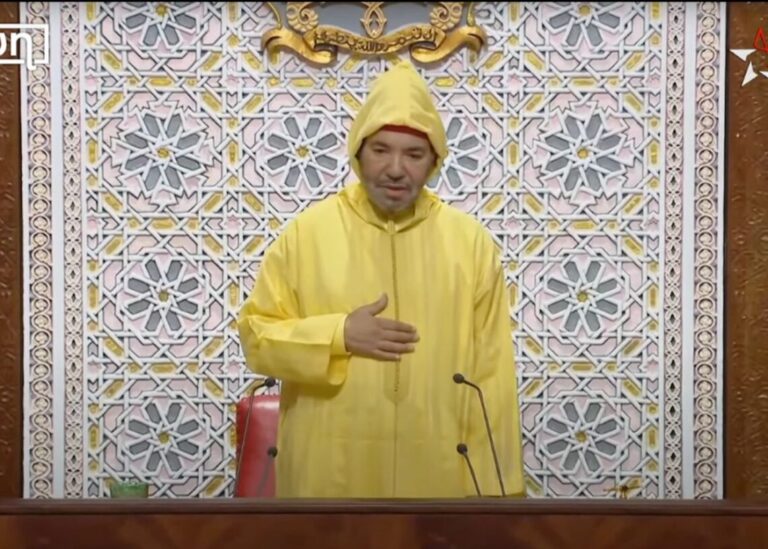Rabat – King Mohammed VI chaired today a Ministerial Council at the Royal Palace in Rabat focused on reviewing the general guidelines of Morocco’s 2026 Finance Bill.
During the meeting, Morocco’s Minister of Economy and Finance Nadia Fettah presented before the King the outlines of the draft law.
She stressed that the finance bill was developed “in light of the High Directives and Royal Instructions, particularly those contained in the two most recent speeches delivered on the Throne Day and at the opening of the legislative year.”
A press release from the Royal Office indicated that the Finance Bill comes amid “an international context marked by uncertainty, affecting global growth prospects.”
The minister projected that Morocco’s national economy should grow by 4.8% in 2025, supported by a rebound in domestic demand and the vitality of productive non-agricultural sectors.
These encouraging results, she said, were made possible thanks to “the control of inflation, which stood at 1.1% at the end of August 2025,” as well as the steady improvement of the budget deficit, expected to reach 3.5% of GDP.
Fettah explained that the new Finance Bill aims to advance the national vision of “Emerging Morocco,” pursuing a model that combines social justice and integrated territorial development, ensuring that “all citizens benefit equally.”
To achieve this goal, the draft budget focuses on consolidating Morocco’s economic gains, deepening structural reforms, and reinforcing the foundations of the social state.
A central element of the plan is the continued stimulation of investment through both domestic and foreign channels.
The government intends to accelerate the implementation of the Investment Charter, deploy the “Morocco Offer” for green hydrogen, and strengthen the business climate through innovative public-private partnerships.
The minister stressed that “particular attention will be given to very small, small, and medium-sized enterprises,” which she described as key drivers of national employment and regional balance.
The 2026 Finance Bill also focuses on territorial equity through a new generation of regional development programs designed in consultation with local actors. The focus will be on creating job opportunities for youth, improving access to education and healthcare, and modernizing underdeveloped areas, particularly mountainous regions and oases.
These programs, Fettah added, will “consolidate the principle of solidarity among territorial entities” and support sustainable coastal development.
Another key focus of the 2026 Finance Bill is the reinforcement of Morocco’s social state.
The government will continue implementing the Royal Project for the generalization of social protection, providing direct support to four million households.
Monthly child allowances are set to be increased to between MAD 50 ($5) and MAD 100 ($10) for the first three children, while specific aid will be allocated to orphans and children housed in social protection institutions.
The efforts in the framework of the social state also include expanding retirement coverage, generalizing unemployment benefits, and continuing direct housing aid for primary residences.
The draft law also allocates MAD 140 billion ($15 billion) for the health and education sectors in 2026 and provides for the creation of 27,000 new positions.
The healthcare budget will support major hospital projects, including the inauguration of new University Hospital Centers in Agadir and Laayoune, the completion of the Ibn Sina Hospital in Rabat, and continued construction in Beni Mellal, Guelmim and Errachidia.
Meanwhile, the education system will undergo accelerated reform through the expansion of preschool education and the improvement of teaching quality and student support services.
The 2026 Finance Bill also reinforces Morocco’s commitment to structural reforms and fiscal stability.
The reform of the Organic Law on Finance will mark “a profound change in the governance of public policies,” orienting state management toward accountability, result-oriented governance, and cross-sectoral and territorial management.
Fettah added that efforts to restructure public enterprises and improve their performance will continue, alongside the modernization of the judiciary to “bring justice closer to citizens and strengthen the attractiveness of the business environment.”
By combining economic strength, social progress, and territorial justice, Morocco’s 2026 Finance Bill reflects the King’s vision of a nation on the path toward sustainable emergence — one that places equality, opportunity, and solidarity at the heart of its development strategy.
The ministerial council also concluded with the adoption of several organic laws, military decrees, and international agreements, as well as a series of high-level appointments across Morocco.


